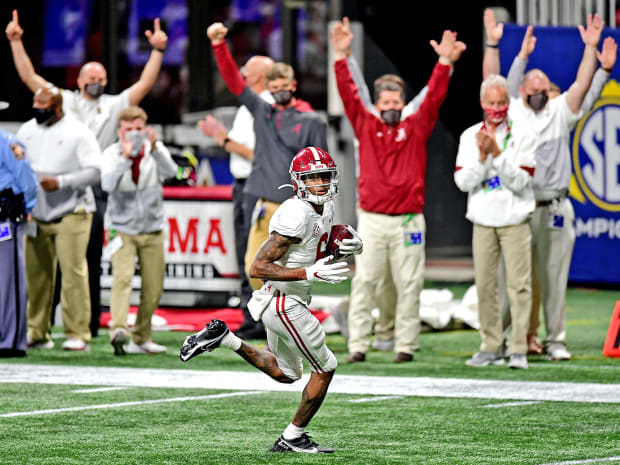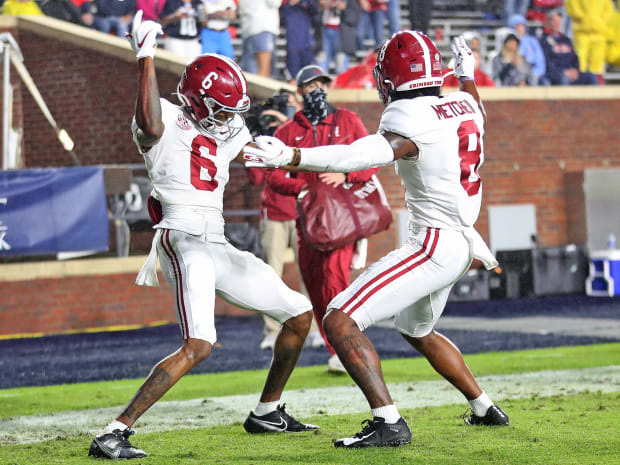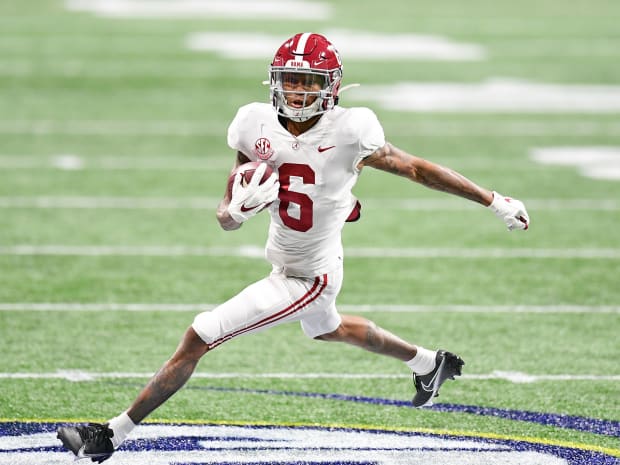The senior known as "Smitty" has put together a truly special career in Tuscaloosa, and he now has chance to go out on top.
Alabama has had some famed pass catchers over the years. Don Hutson is considered the first great wide receiver, modernizing the position in the 1930s. Dennis Homan and Ray Perkins starred on some great teams in the 1960s. Ozzie Newsome was a Hall of Fame tight end in the ‘70s.
But it wasn’t until the Nick Saban Era that Alabama began to stockpile large quantities of elite talent at wide receiver. What started with Julio Jones continued with Amari Cooper, Calvin Ridley and others. There are eight Alabama wideouts on NFL rosters this season.
‘Bama now has achieved peak wideout weaponry. When a team can lose two top-15 NFL draft picks (Henry Ruggs and Jerry Jeudy), then have a third star break his ankle midway through the season (Jaylen Waddle) and still have the best receiver in the nation? That’s Wide Receiver U.

The amazing thing is that DeVonta Smith—the “Slim Reaper” to some and “Smitty” to everyone in the Alabama program—is going to leave school as the most celebrated of them all. The quiet, skinny guy from small-town Louisiana who Saban kept shuffling over to play defensive back in spring practices.
Friday, Smith and the No. 1 Crimson Tide face Notre Dame in the transplanted Rose Bowl. Next week, he will find out whether he becomes the first receiver to win the Heisman Trophy since Desmond Howard in 1991. The week after that, he may well be playing for a second national championship in his four years at Alabama.
Whether his college career ends this week or on Jan. 11, Smith will walk way owning entire sections of the Crimson Tide record book. He is the school’s career leader in receiving yards (3,620) and touchdown receptions (40), and is 14 catches away from the career record in that category as well. He’s also got the single-game school records for catches (15), yards (274) and touchdowns (five).
Smith is not the biggest—at 6' 1", 175 pounds, he’s three inches shorter and 35 pounds lighter than Jones was when he left school. He’s not the fastest—Waddle and Ruggs have been timed at 4.27 in the 40-yard dash, and they staged a match race in 2019 on the Alabama indoor practice field that was dubbed “The Race of the Century.” He’s merely the best.
“Couldn’t happen to a better dude,” said Maryland coach Mike Locksley, who was receivers coach and then offensive coordinator at Alabama in 2017–18. “It’s so rewarding to see it come to fruition the way it has for him. He’s been able to do it on his terms and his time.”
Locksley is just one member of a crowded hallelujah chorus when it comes to singing the praises of Smith. He’s as respected as any player in the Alabama program.
“He’s probably one of the most selfless guys I’ve ever had the opportunity to coach,” Saban said. “He’s one of the most popular guys on the team, and one of the people the players look up to because of his attitude.”

Saban tested Smith’s attitude early, sending the four-star high school prospect from Amite, La., over to play defense in spring ball in 2018. Given the backlog at receiver, it was going to be difficult to get everyone on the field at that position. But Smith was the player who caught the most famous pass in Alabama history just a couple of months earlier, hauling in a bomb from Tua Tagovailoa for a walk-off national championship victory over Georgia.
You’re going to send that guy over to play defense?
“He did a great job,” Saban said. “He never asked any questions, was happy to do it. It speaks volumes for what kind of person he is, what kind of a competitor, what kind of a team player.”
Not only did Smith have the right outlook, Locksley said Saban believed Smith had the toughness to play defense. But after four or five practices, he was back at wideout—too talented to keep out of the mix.
One solution to the overcrowded skill-position talent situation: run more plays. More snaps means more chances to touch the ball. With Locksley calling plays in 2018, Saban came to embrace what he once hated—up-tempo offense.
“The goal was to run 80 plays a game,” Locksley said, aiming to snap the ball with 24 to 28 seconds remaining on the play clock. “More plays means more opportunities to get touches. It was like being handed the keys to a Maserati.”
‘Bama wound up only averaging 67 plays a game that season, because Saban wanted to “take the air out of the ball,” as Locksley put it, with a slower tempo in the second half while playing with a lead, but in the first half the Tide were playing fast. Tagovailoa was the distributor to a wealth of playmakers.
“The best part of that [receiver] group is that they were all selfless,” Locksley said. “You could plug and play them anywhere—outside, slot, out of the backfield. Nobody had any frustration about who had the most targets, and they were as good at perimeter blocking as any I’ve been around. It was beautiful to see them diving and blowing people up in the run game.”
Jeudy was the No. 1 option, catching 68 passes. Then Ruggs, Waddle, Smitty and tight end Irv Smith all were between 42 and 46 catches. Last year, Smitty asserted himself with 68 catches, second on the team to Jeudy’s 77. That included two monster games: 274 yards and five TDs against Mississippi; and 213 yards and two TDs against LSU.
It certainly seemed like the stage was set for all three star wideouts from Alabama’s 2017 recruiting class—Jeudy, Ruggs and Smitty—to be en route to the NFL. But one stayed behind to have a senior season.
“I wanted to finish things the right way,” Smith said. “I wanted to get my degree, be around these guys another year.”

The result has been a dream season. The awards and accolades keep flowing in.
“To me, he’s the best player in college football,” said Georgia coach Kirby Smart, whose team has been burned on multiple occasions by Smith.
“He is extremely detailed in the route running,” Notre Dame coach Brian Kelly said. “Everyone knows about his speed and hands. Somebody who is that young and has the ability to run such exact routes … I would imagine his football IQ is off the charts. He reminds me of a veteran in everything he does.”
Indeed, Smith said attention to detail has been his biggest strength. He patterns some of his route running off NFL stars Keenan Allen and Davante Adams. But it’s not all technique—inside that slim body is also an vicious competitor.
“He’s unassuming,” Locksley said. “But his competitive nature is so ferocious, you do not want to wake up the sleeping bear. He does not talk a lot, but if you start it, he will finish it.”
Here is what DeVonta Smith is finishing in the coming weeks: his college career as the greatest ever at Wide Receiver U.